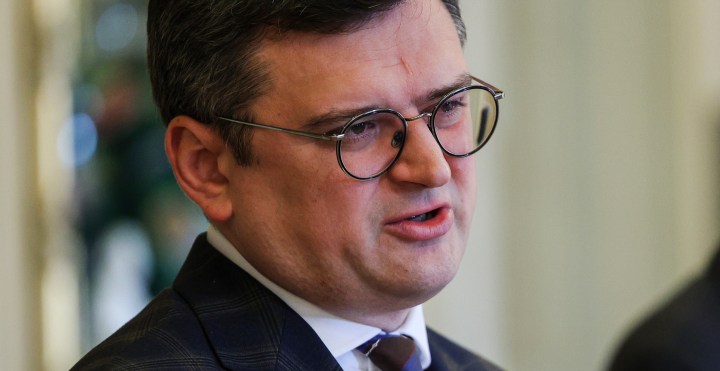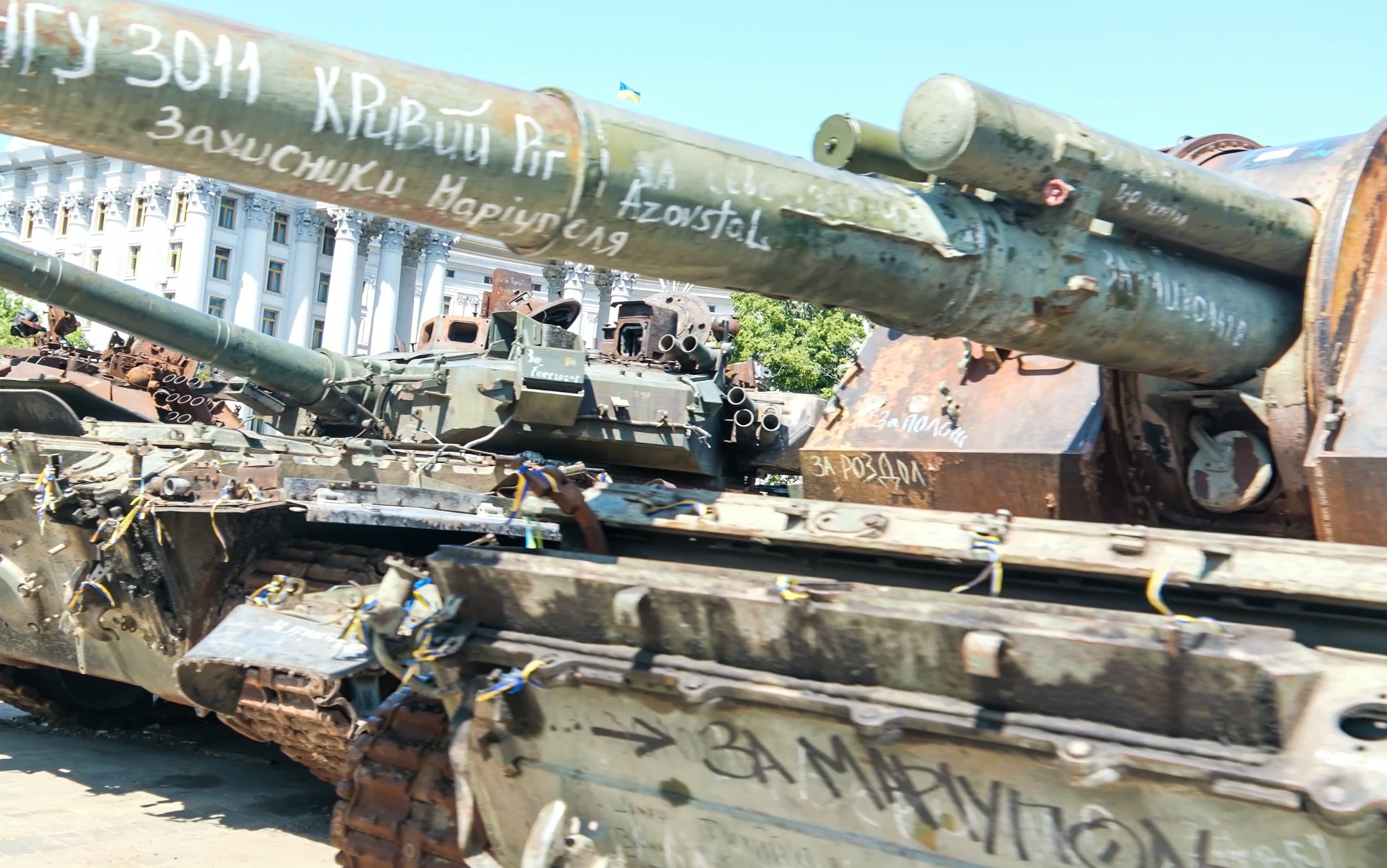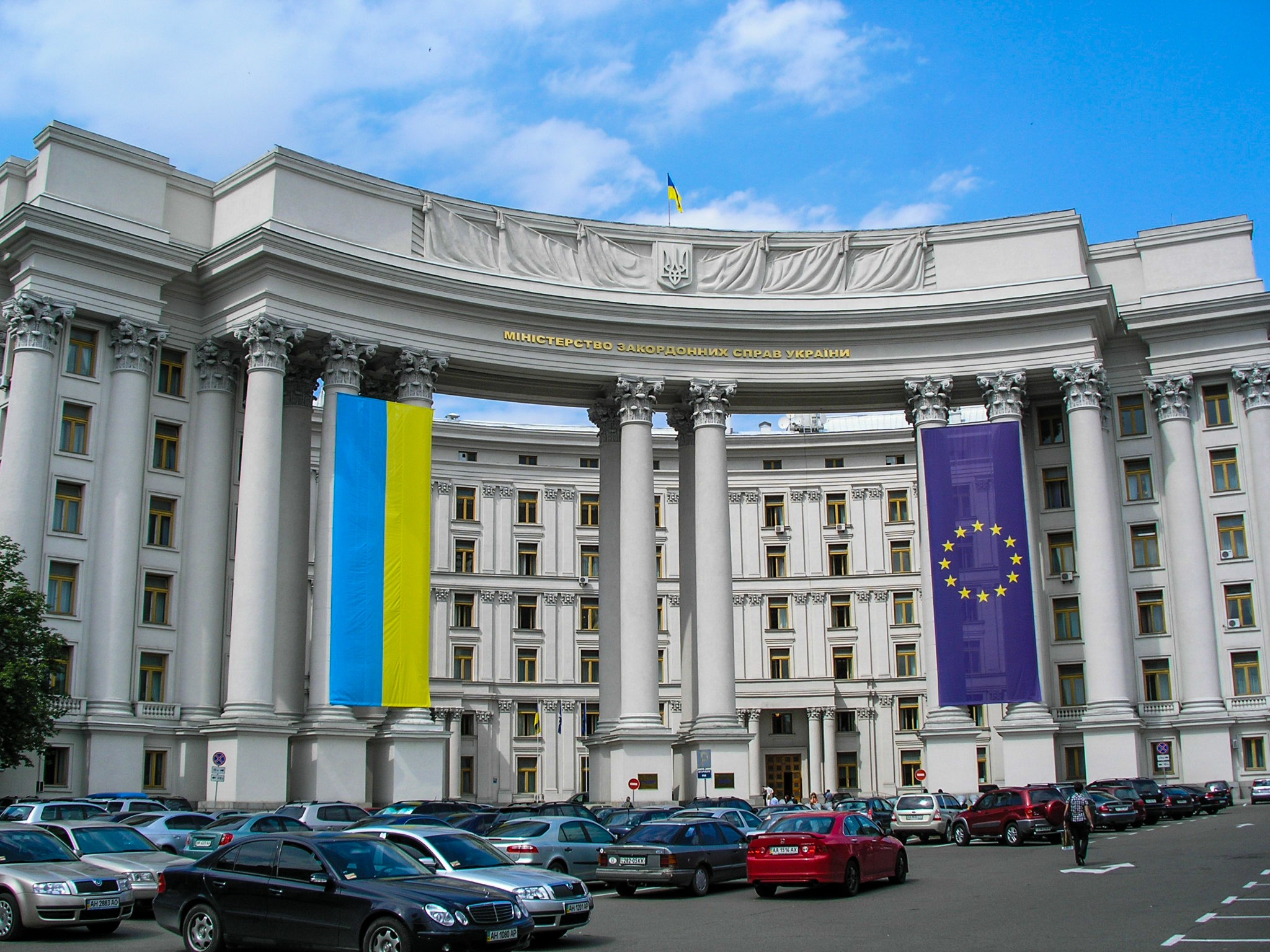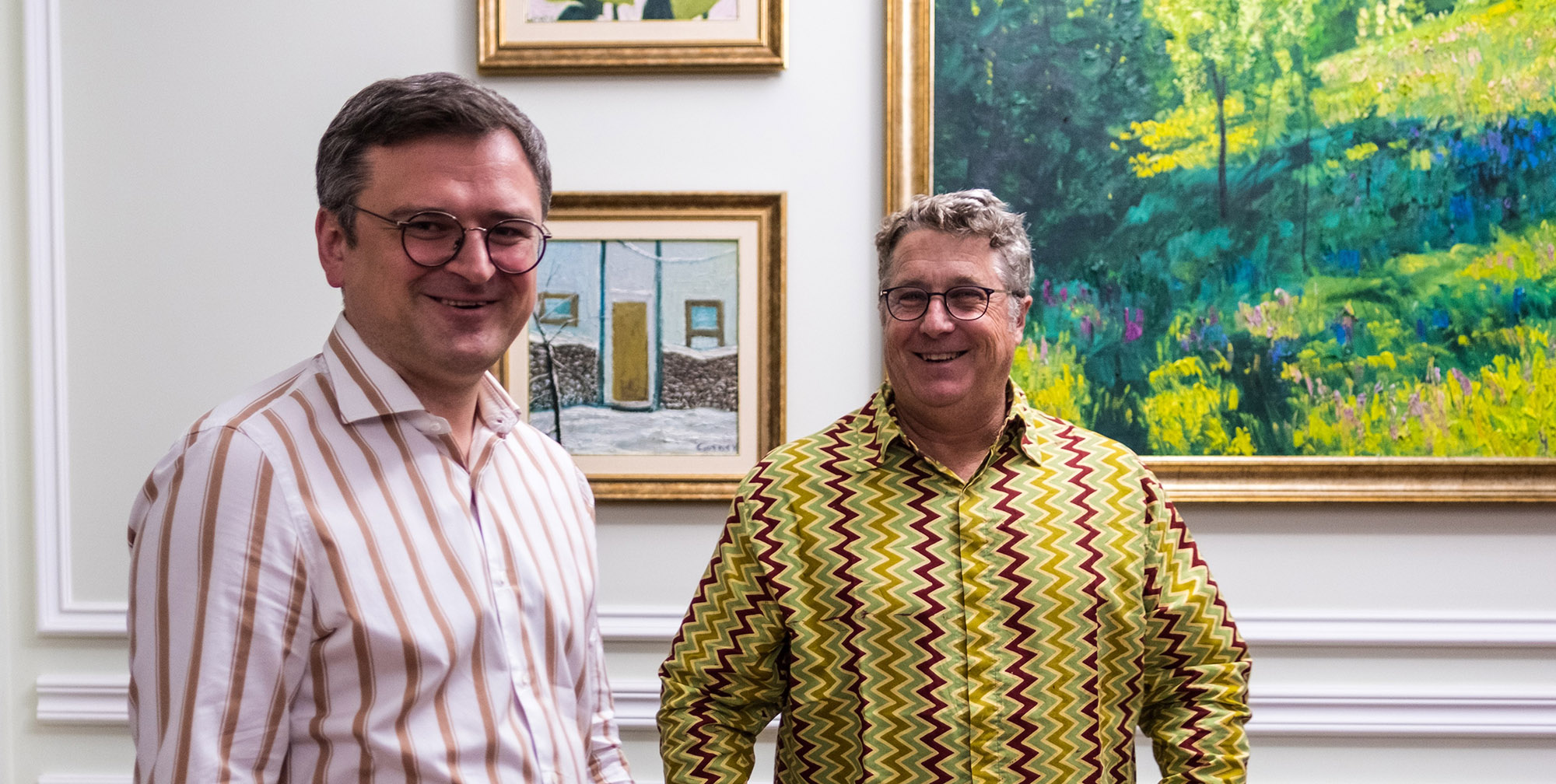INTERVIEW
Ukraine foreign minister Dmytro Kuleba speaks out on African Peace Initiative and negotiating from strongest position possible

‘This is the war for freedom and the right to make our Ukrainian choices instead of accepting Russian choices imposed on us as if they were ours,’ he says.
Situated on Kyiv’s Mykhailivska Square, the neo-classical façade and columns of the Ukrainian Ministry of Foreign Affairs are offset somewhat by the collection of burnt and battered Russian materiel gathered in the square, a reminder both of the costs of complacency and Ukrainian stoicism. The square is named for its close proximity to St Michael’s Monastery, the seat of the Ukrainian Orthodox Church, whose walls have been plastered with pictures of Ukrainian casualties of the conflict.

Russia has lost as many as 10,000 armoured vehicles in this war, so far, as these relics on Kyiv’s Mykhailivska Square remind. (Photo: Richard Harper)
Dmytro Kuleba, Ukraine’s youthful foreign minister, had returned the previous day from a trip to Africa, which crisscrossed the path of Sergey Lavrov, his Russian rival, who was making his way through multiple stops towards the meeting of BRICS foreign ministers in Cape Town.
The topic of our discussion was the forthcoming African peace mission and the role of peace talks, more generally, in bringing the 15-month war with Russia to an end.
The Ukrainian government presented its 10-point peace formula in November at the G20 summit. Rejected almost immediately by Russia, this plan focuses on:
- Restoring safety around Europe’s largest nuclear power plant, Zaporizhzhia, in Ukraine;
- Ensuring food security, including the protection of Ukrainian exports;
- Creating the conditions for energy security, including price restrictions on Russian resources as well as assistance in restoring Ukraine’s own power infrastructure damaged by Russian attacks;
- Releasing prisoners of war and the estimated 20,000 Ukrainian children kidnapped and deported to Russia;
- Restoring Ukraine’s territorial integrity;
- The withdrawal of Russian troops and cessation of hostilities, and the restoration of Ukraine’s state borders with Russia;
- The establishment of a special tribunal to prosecute Russian war crimes;
- The prevention of ecocide and the need for protection of the environment, with a focus on demining;
- Preventing the escalation of the conflict, including the creation of guarantees for Ukraine; and
- The need for a final peace agreement signed by all parties.
Since then, in February, China has proposed a 12-point peace plan. Actually, this was less of a plan than a list of policy positions since, as the German chancellor, Olaf Schulz, has noted, it does not call for the withdrawal of Russian forces from Ukraine.
A Russian defeat does not serve Chinese interests
The main similarity between the two plans is that they both want the war to end.
The main difference is that Ukraine wants Russia to pay for its invasion, while China is trying to avoid hurting its ally. China wants the war to end, given the cost to the global economy. It would, moreover, clearly benefit from inserting itself at the heart of European security. But a Russian defeat does not serve Chinese interests, particularly if it leads to President Vladimir Putin’s demise.

Ukraine’s European aim is on display at the Ministry of Foreign Affairs in Kyiv. (Photo: Richard Harper)
In fact, Beijing’s 12-point statement violates several core principles of effective mediation.
For one, it privileges China’s interests in its argument to protect the global economy.
It also empowers bad faith, by not calling for a Russian withdrawal, by describing the war as the “Ukraine crisis” rather than the “Ukraine-Russia crisis”, and by promoting a version of sovereignty which could conceivably cede the annexed territories to Russia, an unacceptable concession for the Ukrainians even before they hit the negotiating table.
The Chinese text also supports Russia’s claim that the invasion was prompted by Western expansionism and that Ukraine was developing weapons of mass destruction. There is no evidence of the latter; and Russia was the one doing the invading, while Ukraine has been fighting for its survival and the freedom to do as it chooses.
While the China plan includes confidence-building measures around nuclear safety and POWs, it does not strengthen tools for managing escalation, but rather calls for the removal of all unilateral sanctions, a critical restraining measure on Russia. And it seemingly ignores the fact that the Ukrainians earlier published their own plan, meaning that China is “advocating for the abandonment of some key interests before ever reaching the proposed negotiating table”.
As such, this undermines trust in China’s good offices as a peace broker, a failure that the forthcoming African peace mission would do well to heed.
President Cyril Ramaphosa is set to jet off in two weeks to Ukraine and Russia with an African presidential team including leaders from Comoros, Zambia, Uganda, Senegal and Egypt. There is no formal agenda for the African group, apparently, aside from it being billed as a fact-finding trip. And suspicions exist about its impartiality, given particularly South Africa’s convening role and its tightness with the Russians.
‘War for freedom’
Kuleba is crystal clear in laying out the core conditions for Ukraine of any peace deal. ‘This is the war for freedom and the right to make our Ukrainian choices instead of accepting Russian choices imposed on us as if they were ours,’ he says.
Even though he is “not aware of any specific initiative that they are coming with”, he welcomes the African mission to come to Ukraine “to talk and to see whether there is a space to do something and to come up with a specific proposal”. The foreign minister would like “to unite as many countries as we can” around Ukraine’s own 10-point plan, thus representing a global consensus.
“If anyone has ideas for an alternative peace proposal,” he says, this should respect two fundamental principles: it should not imply territorial concessions by Ukraine; and it should not lead to the “freezing” of the conflict.
“If this is the case, we are ready to sit down and talk on how to integrate your peace proposal with our peace proposal,” he says. “African nations would agree… that if the war takes place in your territory and if you were attacked, then you have the right to define the fundamental principles of the settlement. It shouldn’t be someone else who would impose these principles on you.
“I want [a South African audience] to understand what Russia does now towards Ukraine is exactly what the apartheid regime was doing against Namibia, Mozambique, Angola, Zimbabwe… trying to turn them into satellites by force,” Kuleba observes. “If your friendly attitude towards Russia is based on historical sentiments, this Russia is neither the Soviet Union nor the Russia that you used to know before last February. This is a different country.”
Also on the historical aspect, recalling that it was Ukraine, one of the original founding nations of the United Nations, which chaired the UN Special Committee Against Apartheid, Kuleba claims, “Russia has privatised the legacy of the Soviet Union, but in real terms it was the legacy of all the republics comprising the Soviet Union.”
And for those in Africa who favour Russia “not because of history but because of today, because of Russia’s policy… most likely they are either buying Russian propaganda, and it’s always bad when someone manipulates you, or maybe they are on the payroll, because we know how much Russia invests in making people broadcast their narratives. Whatever their reasons for favouring Russia are, this is a very bad idea,” he says.
“And most importantly, Russia is going to lose. Strategically Russia is already losing. From the policy perspective, it is always better to be on the side of the winner.”
Of the credibility of Africans to negotiate a peace, including South Africa, “It is about, what specifically are you doing to help end the war on just terms? Not on any terms, but on just terms. And we understand that South Africa has a special relationship with Russia, and they cherish that relationship,” he says.
“In the end, it’s the choice of every country who you want to make friends with and bear the consequences of that friendship. In the end, it’s the case for every country to decide, do they prefer respecting international law, or respecting their personal relations with leaders who violate international law, and who find themselves under investigation?”
Any peace plan will fail if, like the Chinese variant, it prejudices the talks before they start. When they finally get to the table, of course, that is where and when the horse trading will begin. While it is folly to imagine that one side would make concessions at this stage, it is not inconceivable that both sides will have to “get” something.
For example, in exchange for leaving, Putin will need a face-saving concession, perhaps Ukraine not formally joining the EU or Nato for a set period, maybe as long as he is the leader of Russia. Equally, the Ukrainians are going to need security guarantees, whatever the exact institutional arrangement.
Mediation as an excuse
Critically, says the foreign minister, “many tried and very few succeeded” at mediation. “We learnt that if mediation is a sincere effort, then countries prefer to focus on resolving specific issues, like Turkey and the United Nations… [on] food security.”
But there is “another type of mediation, which is mediation as an excuse, where you say, ‘I am not doing this and that, because I am going to mediate.’ Now, mediation is not about that,” he says. “Some try to mediate to solve problems, while others pretend they mediate to avoid solving problems. And it’s up for South Africa or any other country to make their choice.”
Kuleba realises, “You can win peace by winning on the battlefield on the one hand, and by enlarging a diplomatic coalition in favour of peace based on the idea of the restoration of Ukraine’s territorial integrity and sovereignty. These are the two wings of the dove of peace.”
While, “Every war ends at the table, our task is to bring Ukraine to the table in the strongest position possible. No war ends when the peace document is signed, since every war is followed with sorting out the consequences of war.”
The “ultimate condition of everything”, he states, is the need for Russians to leave Ukraine.
“It is not us who invaded Russia,” he reminds. “And we never had any plans to do so. It is Russia who invaded Ukraine. We will not tolerate any single Russian soldier on Ukrainian soil.”

Foreign Minister Kuleba and Greg Mills in Kyiv, June 2023. (Photo: Richard Harper)
In this regard, he makes two points for African leaders based on his recent tours across Africa.
First, “Be on our side… while we are fighting the war.” And second, “Here is what you and us can do together for the mutual benefit of our nations, and we can lay the foundations of this cooperation today… so that after the war ends we can already be benefiting from it.” This includes food security, the development of farming, digitisation of public services, eradicating corruption, general trade, pharmaceuticals and cyber security.
“Our problem is that, unfortunately, I recognise that, since 1991 when Ukraine gained independence, we were absorbed by our internal issues and our return to European political and legal space after spending 300 years as part of the Russian empire, and we were not paying… the level of attention to Africa that it deserves. So, most of the things that happened in our relations with Africa since 1991 were happening by inertia from Soviet times. And we lost a lot.”
Now, he says, “I work for the Ukrainian-African Renaissance.” DM
Greg Mills has been in Ukraine for The Brenthurst Foundation. www.thebrenthurstfoundation.org




















 Become an Insider
Become an Insider
Dear Dr Mills, did the Brenthurst Foundation advise the Ukrainian regime to burn 40 million Russian books last year? If not did you protest against it when in Kiev?
So silly. This claim is false. It is on the the website of the world socialist website which emanates from the Fourth International. The same article goes on to describe the zelensky government as infected by fascist elements?!
I find it just baffling that left wingers love and admire that right wing ultra nationalist tyrant currently in office in Moscow. One hopes not for much longer since this insane war is going so badly.
I think you mean ban not burn and it was 19 million Soviet era books that were banned from libraries after the invasion.
Still waiting for the media to give an equal voice to victims of apartheid regimes and their supporters agendas that benefit from the oppression of the weaker countries.
Very informative article. Thanks.
Kuleba reads CR and ANC stance well.
South Africa should rather focus on its serious problems at home than attempting to throw their rather light weight around on the world stage. With the reputational damage the SA foreign office has already brought on itself, there’s more chance of SA putting its foot in its mouth within the Ukraine context than resolving hostilities. SA has not answered questions regarding allegations of cooperation with Russia; instead its has attempted to evade answering. Any fool can see that SA’s actions, that cannot be disputed, point directly to the fact that SA is not a neutral party in regards to its relations with Russia. It is pretty clear that SA has become yet another of Putin’s ‘lap dogs’. They say Putin has a soft spot for dogs.